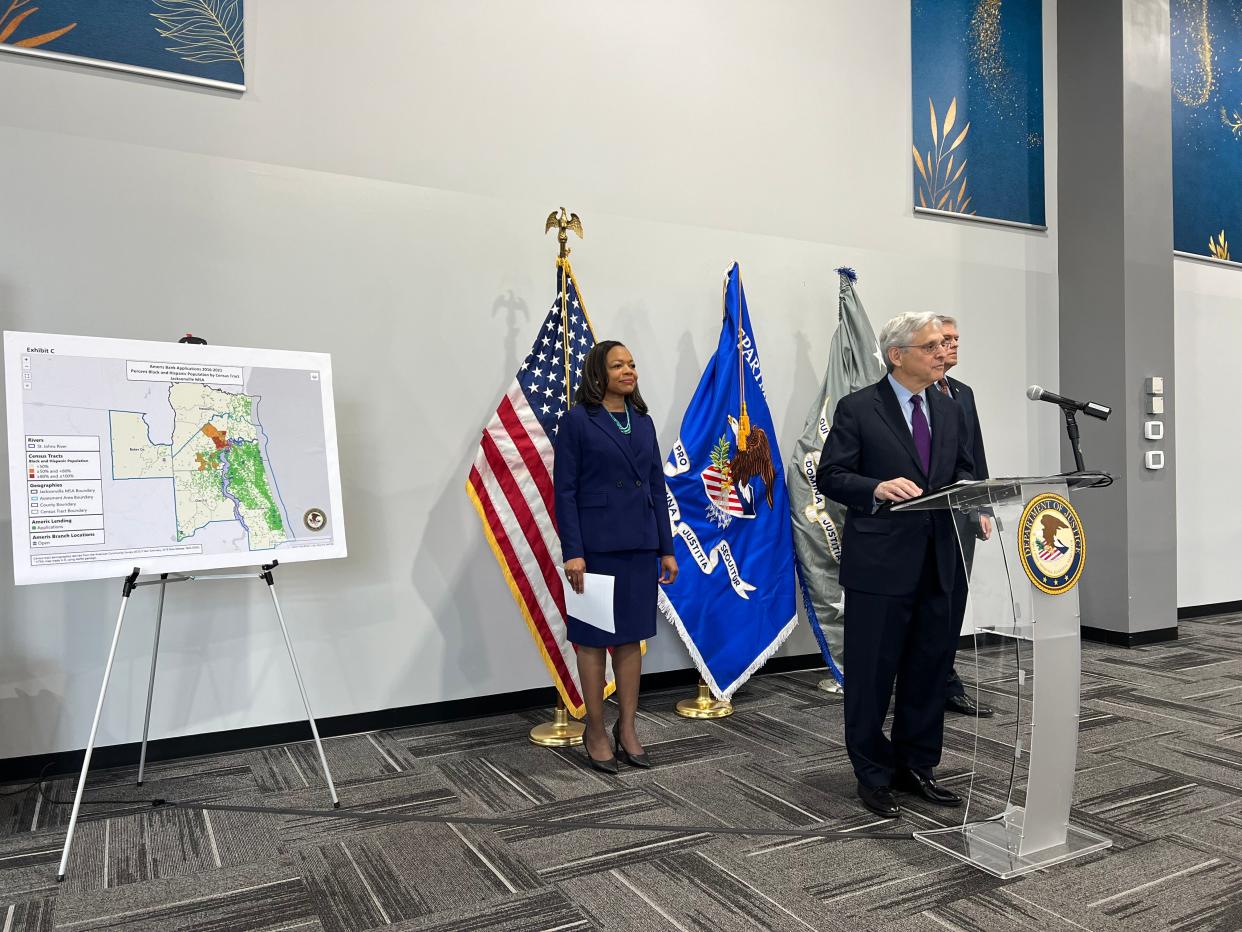$9 million coming to Jax neighborhoods: Judge accepts Ameris Bank, DOJ redlining settlement

- Oops!Something went wrong.Please try again later.
- Oops!Something went wrong.Please try again later.
A federal judge approved a redlining settlement Tuesday that will bring an influx of lending opportunities and community partnerships into majority Black and Hispanic Jacksonville neighborhoods.
U.S. Attorney General Merrick Garland and Assistant Attorney General Kristen Clarke of the Civil Rights Division came to Jacksonville last month to announce the agreement with Ameris Bank.
The Department of Justice alleged the institution, based in Atlanta, engaged in a modern form of redlining, a type of housing discrimination that led to fewer financial opportunities, and sought $9 million in resources for the affected neighborhoods.
“This settlement marks a new pinnacle in our efforts to bring an end to redlining and provides tangible relief to communities that have been starved of access to credit for far too long,” Clarke said on the Oct. 19 visit to Jacksonville.
More on settlement DOJ seeks $9 million settlement with Ameris Bank for redlining practices in Jacksonville
Deegan's housing options: Mayor Donna Deegan's affordable housing transition subcommittee makes draft recommendations
The DOJ alleged Ameris Bank avoided lending to majority Black and Hispanic communities, leading to a systematic economic decline in those areas. The settlement approved Tuesday outlined ways Ameris must correct the practice, ranging from training opportunities of staff to financial programs for residents.
Ameris CEO Palmer Proctor issued a statement after the DOJ announced the settlement, saying the bank complied in order "avoid the distraction of litigation" and focus on providing housing opportunities. Proctor and the company denied any allegations of redlining.
"The terms of this settlement are consistent with the bank’s existing programs and initiatives," Proctor said. "We condemn discrimination in any form and remain committed to helping people in underserved communities gain equal opportunity to achieve homeownership, as well as access to banking services.”
Ameris has a number of responsibilities through the settlement to increase its fair lending practices.
Financially, it must allocate $7.5 million into a loan subsidy fund to increase home mortgage, improvement and refinance loans in the areas affected by redlining. Each applicant may only receive up to $20,000 through the program.
The bank must also spend at least $120,000 per year, over five years, on a partnership with community-based or governmental organizations to provide affected Jacksonville residents with services relating to credit, financial education, foreclosure prevention and homeownership.
Lastly, Ameris will spend at least $180,000 per year, over five years, on advertising in the affected neighborhoods – something the government alleged it specifically did not do in recent years.
The bank will also have to add to its staff, submit a detailed annual evaluation of its fair lending program to the government and provide staff with fair lending training. It will also hire a director of community lending to oversee the development of lending practices in Jacksonville’s Black and Hispanic communities.
The bank will open a new full-service branch north of the St. Johns River in an affected, majority Black or Hispanic neighborhood, preferably within the next two years. Currently, the bank operates 18 full-service branches in Jacksonville, none of which are in a majority Black or Hispanic neighborhood.
The settlement is a win for the Department of Justice’s “Combatting Redlining Initiative,” a program started in 2021 that has since secured $100 million to fight the practice through similar lawsuits.
Neither Garland nor Clarke addressed if the DOJ’s ongoing investigations focused on other Jacksonville institutions, but they encouraged banks to acknowledge and correct practices on their own.
“We encourage financial institutions to proactively assess their redlining risk and immediately take corrective action to reach underserved communities in their market areas,” Clarke said. “We will not stand idly by while financial institutions avoid communities of color in their markets, or erect barriers that make it harder for residents in underserved communities to receive lending opportunities.”
This article originally appeared on Florida Times-Union: Judge Howard accepts Ameris Bank, DOJ Jacksonville redlining settlement

